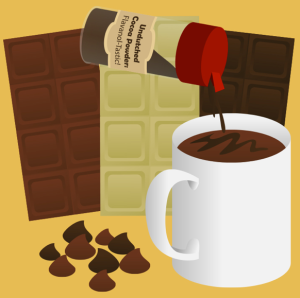Delicious Chocolate FAQs
 What’s the difference between milk, dark, and white chocolate?
What’s the difference between milk, dark, and white chocolate?
- Milk chocolate is made of sugar, cocoa butter, milk solids, and chocolate liquor.
- Dark chocolate (also called bittersweet or semi-sweet) is made of sugar, cocoa butter, and chocolate liquor. It has more cocoa solids than milk chocolate.
- White chocolate doesn’t have any cocoa solids, just cocoa butter, sugar, and flavorings.
Is chocolate addictive?For some people, chocolate seems to be as addictive as alcohol or drugs. Experts attribute cravings mainly to chocolate’s “hedonic” appeal -- the fat, sugar, texture, and aroma of chocolate. But chocolate also stimulates the release of endorphins and the body’s other “feel good” substances.How can I satisfy my chocolate craving without gaining weight?Lower-fat ways to satisfy a chocolate craving include small portions. Try bite-size peppermint patties, Hershey’s Simple Pleasures, etc. You can also use sugar-free chocolate syrup to add chocolate flavor to fruit, coffee, and milk. It’s also interesting to note that chocolate chips have 20% fewer calories than chocolate bars.Is chocolate high in caffeine??A 1.3 ounce serving of chocolate has about the same amount of caffeine as a cup of decaffeinated coffee.Does chocolate cause acne, headaches, or kidney stones?Chocolate contains oxalates, which may lead to kidney stones in those who are susceptible. It is also thought to trigger migraines in some people. But there is no evidence that chocolate causes acne.Why should I care about chocolate?Researchers are serious about chocolate…they recently formed the International Society of Chocolate and Cocoa in Medicine.Dark chocolate is on the University of Michigan Integrative Medicine’s “Healing Foods Pyramid.” It’s at the tip of the pyramid, indicating that it is optional and should be eaten in moderation.By Hollis Bass, MEd, RD, LDSources:
- CFFH articles/handouts
- J Am Clin Nutr. 2012 Mar;95(3):740-51
- Mauritas. 2011 Aug;69(4):312-21
- Cochrane Database Syst Rev. 2012 Aug 15;8:CD008893
- BMJ. 2012;344:e3657
- Arch Intern Med. 2012;172(6):519-21
- J Am Diet Assoc. 1999;99:1249-56
- Eur J Clin Nutr. 2011 Aug;65(8):879-86
- Br J Clin Pharm. 2013 Mar;75(3):716-27
- CSPInet.org
- National Confectioners Association’s Chocolate Council: www.thestoryofchocolate.com


